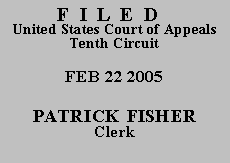

|
JOHN H. MAHORNEY,
v.
LISA BUCKLES |
|
Before EBEL, MURPHY, and McCONNELL, Circuit Judges.
This case is before the court on John Mahorney's pro se request to proceed on appeal in forma pauperis. Mahorney seeks to proceed in forma pauperis so that he can appeal the district court's dismissal of his 42 U.S.C. § 1983 civil rights complaint. The district court dismissed Mahorney's complaint pursuant to 28 U.S.C. § 1915(e)(2), concluding that the suit was frivolous because it lacked a basis in either law or fact. See Schlicher v. Thomas, 111 F.3d 777, 779 (10th Cir. 1997) (holding that an action is frivolous under § 1915(e)(2)(B)(i) if "the claim [is] based on an indisputably meritless legal theory or if it is founded on clearly baseless factual contentions"). This court reviews the district court's dismissal based on frivolousness for abuse of discretion. Conkle v. Potter, 352 F.3d 1333, 1335 n.4 (10th Cir. 2003). Like the district court, we construe pro se pleadings liberally. See Haines v. Kerner, 404 U .S. 519, 520 (1972).
Applying the standards set out in § 1915(e)(2)(B)(i), and after careful review of the record on appeal and Mahorney's filings, it is absolutely clear that the district court did not abuse its discretion in determining that Mahorney's complaint was so vague and conclusory that it clearly failed to state an injury of constitutional magnitude. Accordingly, we DISMISS the appeal as frivolous pursuant to 28 U.S.C. § 1915(e)(2)(B)(i). Dismissal of Mahorney's appeal as frivolous counts as a strike against him, as does the district court's dismissal of his complaint. See Jennings v. Natrona County Det. Ctr. Med. Facility, 175 F.3d 775, 780 (10th Cir. 1999). Thus, Mahorney has accumulated at least two strikes for purposes of the filing restrictions set out in 28 U.S.C. § 1915(g). Mahorney is reminded of his obligation to continue making partial payments of the appellate filing fee until paid in full.
ENTERED FOR THE COURT
Michael R. Murphy
Circuit Judge
*. This order and judgment is not binding precedent, except under the doctrines of law of the case, res judicata and collateral estoppel. The court generally disfavors the citation of orders and judgments; nevertheless, an order and judgment may be cited under the terms and conditions of 10th Cir. R. 36.3.